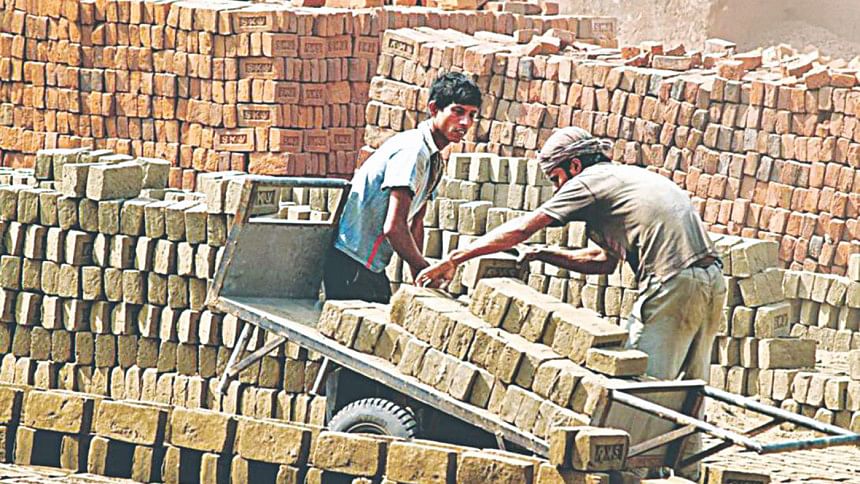Informal workers struggling to make ends meet

"I can't get you to understand how I managed to pay for meals over the past four days," a dejected labourer, Muzahid Hossain, said yesterday.
His livelihood involves engaging in manual work for which he gets paid at the end of the day. So, if work is not available even for a single day, there is practically no way to make up for it when trying to make ends meet.
Talking to The Daily Star in front of Mukto Bangla Shopping Complex in Mirpur-1, he said he has been arriving there very early in the morning as usual but no one was there to hire labourers over the past four days.
His financial situation has been in dire straits as he had to borrow Tk 2,000 from a neighbour with interest just to get by.
Day labourers in Dhaka are among those who are suffering the most due to the ongoing unrest along with the curfew imposed by the government to stem the violence.
Although wage growth in Bangladesh has been slowly climbing since July 2021, it has remained below the inflation rate for the past two and a half years.
Wages of low-paid and unskilled workers grew 7.95 percent in June, which was 1.77 percentage points below the inflation rate of 9.72 percent in the same month, showed the wage index of the Bangladesh Bureau of Statistics (BBS).
This trend has been continuing for the past 29 months, as per BBS data.
The annual average price spike in Bangladesh surged to its highest level in 12 years in the just concluded fiscal year despite easing in June, reflecting the persistent erosion of real income and the deterioration of the living standards of the lower-income groups.
This is forcing low-income and unskilled workers to cut consumption amid falling real incomes.
The ongoing unrest has added to their woes.
Anis Bhuiyan, a rickshaw puller residing with his four-member family in Muslim Bazar area of Mirpur, said he can usually keep Tk 800 to Tk 1,000 for himself after paying the Tk 350 daily rent to the vehicle owner.
Now he was hardly able to earn even half, reasoning that he was unable to go long distances using the main roads.
"Schools and colleges remain shut. General people don't come out except for urgent needs. As a result, rickshaw pullers like me are not getting a sufficient number of passengers, which has reduced earnings," he said.
"It is very tough for me to survive in Dhaka with a family. If the situation continues, I will be forced to leave the city," he added.
Construction worker Azizul Islam has been sitting idle for the last couple of days as the project site where he had been employed had suspended works.
"When the prices of everything are rising, sitting idle feels suffocating. I have almost used up my meagre savings," said Islam, who lives with his five-member family at Mirpur 11.
Nurul Alam, a 22-year-old man, recently joined mason Maruful Haque as an apprentice working at a site in Sangbadik Abasik Elaka in Mirpur, working round the day pulling off old plaster from bathrooms to set tiles.
"I dropped my studies and left home to make a living because of my family's financial insolvency," said Alam, who hails from Barishal sadar upazila and now lives with his maternal uncle near Kalshi Bazar in Dhaka.
"Initially I was running a battery-run rickshaw for hire but stopped doing so since last week as the number of passengers drastically decreased for all the educational institutions being shut down," he said.
"Now I am stuck in a new crisis. What is there for me to do when the country has come to a standstill? It is really tough for newcomers to survive in this condition," he said.
Meanwhile, Selim Reza, a porter working at Karwan Bazar, one of the largest kitchen markets in the capital, also saw his daily earnings fall drastically.
He usually earns Tk 800 to Tk 1,000 a day but amidst the unrest, he can manage at best Tk 200 to Tk 250. This has forced him to take a loan of Tk 10,000 from his neighbour with interest.


 For all latest news, follow The Daily Star's Google News channel.
For all latest news, follow The Daily Star's Google News channel. 



Comments